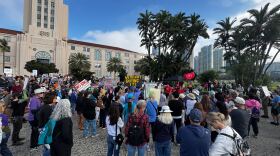Updated September 28, 2021 at 4:53 PM ET
Children born in 2020 will experience extreme climate events at a rate that is two to seven times higher than people born in 1960, according to a new study in the journal Science.
With the current rate of global warming and national policies that fail to make necessary cuts in heat-trapping pollution, climate events such as heat waves will continue to rise in frequency, intensity and duration, scientists say. That leaves children of younger generations facing a "severe threat" to their safety, according to the study's authors.
The study analyzed extreme climate events such as heat waves, droughts, crop failures, floods, wildfires and tropical cyclones. Researchers used recent data from a 2021 Intergovernmental Panel on Climate Change report that included information on global life expectancy, population trends and projected trajectories of global temperatures.
36 times more heat waves
The forecasts for how these events could drastically affect younger generations were startling.
The scientists compared a person born in 1960 with a child who was 6 years old in 2020. The 6-year-old will experience twice as many cyclones and wildfires, three times as many river floods, four times as many crop failures and five times as many droughts.
Heat waves, though, will be the most prevalent extreme climate event, with 36 times as many occurring for the 6-year-old.
Younger generations in lower-income nations will be most affected
The study shows that extreme weather events could affect younger generations in various regions of the world differently. People who were younger than 25 years old by 2020 in the Middle East and North Africa will likely experience more exposure to extreme climate events compared with other regions. The researchers say overall, younger generations in lower-income countries will experience the worsening climate at a higher rate than their peers in wealthier countries.
The data from the study shows how limiting the increase in global warming and adapting policies that align with the Paris climate accord are beneficial, the researchers argue. But even then, younger generations are still left with "unprecedented extreme event exposure," they write.
Thunberg speaks out at the Youth4Climate summit
The study's release this week comes as youth climate activists were gathering Tuesday in Milan, Italy. The Youth4Climate summit featured speeches by Greta Thunberg of Sweden and Vanessa Nakate of Uganda, who both criticized world leaders for not taking meaningful action on climate change.
Thunberg, 18, accused leaders of too many empty words.
"This is all we hear from our so-called leaders: words. Words that sound great but so far have led to no action. Our hopes and dreams drown in their empty words and promises," she said. "Of course, we need constructive dialogue, but they have now had 30 years of blah, blah, blah. And where has this led us?"
Nakate, 24, also pointed out how climate change disproportionately affects the African continent — despite its carbon emissions being lower than that of every other continent with the exception of Antarctica.
"For many of us, reducing and avoiding is no longer enough. You cannot adapt to lost cultures, traditions and history. You cannot adapt to starvation. It's time for leaders to put loss and damage at the center of the climate negotiations," Nakate said.
Copyright 2022 NPR. To see more, visit https://www.npr.org. 9(MDAzMjM2NDYzMDEyMzc1Njk5NjAxNzY3OQ001))







